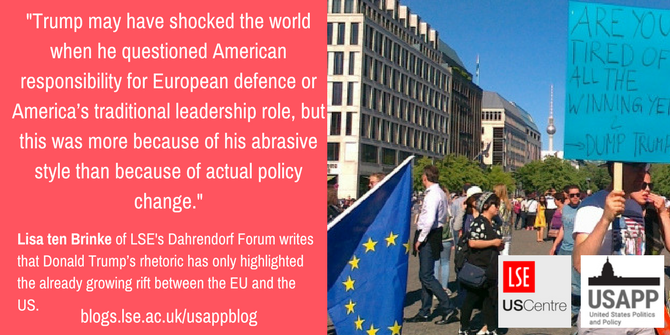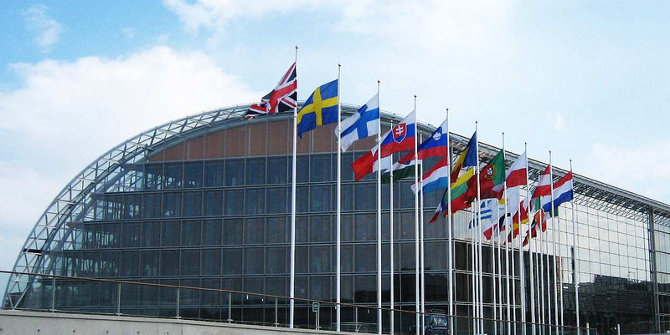 On the first anniversary of Donald Trump’s presidency, the future of the transatlantic relationship is as uncertain as ever. According to Lisa ten Brinke, the rift between the EU and the US began before Trump entered the Oval Office, and this is not likely to change any time soon.
On the first anniversary of Donald Trump’s presidency, the future of the transatlantic relationship is as uncertain as ever. According to Lisa ten Brinke, the rift between the EU and the US began before Trump entered the Oval Office, and this is not likely to change any time soon.
Just over one year ago, the world watched as Donald Trump became the 45th President of the United States. In Europe, his inauguration signalled the beginning of an insecure and unpredictable time for the transatlantic relationship. As Trump promised to put ‘America First’ and called NATO ‘obsolete’, politicians, journalists, and citizens on both sides of the Atlantic feared for the future of US-European relations.
One year on, what damage has Trump done to the transatlantic relationship? Have his words been met with deeds? And what does his rhetoric tell us about the strength of the bond between Europe and the US?
America First…
Trump’s strong rhetoric during the campaign, in which he denounced the Washington elite and their foreign policy approach, implied he would move away from the liberal world order towards a more isolationist worldview. Trump promised to break with President Obama’s legacy, pledging to walk away from international arrangements as varied as the Iran nuclear deal, the Paris climate agreement, and multilateral trade negotiations such as Transatlantic Trade and Investment Partnership (TTIP)—all policies made possible through cooperation with European allies. From now on, Trump promised, it would be ‘America First’, and long-standing allies could no longer bank on US support.
Especially worrying to Europe were Trump’s welcoming of Brexit as “a fantastic thing” and his comments about the EU, which he criticised and reduced to “a vehicle for Germany”. Experts feared that, once in power, Trump would pursue a strategy that would further undermine multilateral institutions such as the EU in favour of bilateral relations, resulting in further weakening of an already-struggling Union. Combine this with Trump’s curiously soft stance towards Putin’s Russia and the long-lasting European nightmare of becoming the US and Russia’s bargaining chip in their game of power politics suddenly did not seem that far from reality.
…Or Empty Threats?
Following this threatening rhetoric, however, surprisingly little has happened. As a response to Trump’s failure to commit to NATO’s Article 5, which outlines the commitment to collective defence, his cabinet rushed to reassure American allies that the US government was still committed to European defence and security. Trump’s words were written off as “tough love” by his National Security Advisor, H.R. McMaster, while his Defence Secretary, James Mattis, gave a passionate pro-NATO speech at its headquarters in Brussels. Soon after, Trump adopted softer language, claiming NATO was now “no longer obsolete”, and declared to be “totally in favour” of the “wonderful” EU. In line with this new rhetoric, the US did not make any changes to its troop contributions to NATO.

“pariser34” by bungo77 is Public Domain
A similar process took place in other foreign policy areas, where strong rhetoric was gradually replaced with a more moderate stance or followed by a lack of policy action. While still speaking positively about Putin, for example, Trump backtracked on his earlier plans to lift or not renew certain sanctions. And although Trump repeatedly denounced both the Paris climate deal and the nuclear agreement with Iran, there has not (yet) been any policy change. The president’s recent comments on the US “conceivably” rejoining the Paris agreement illustrate the disconnect between what Trump says and what he does.
The slow pace of Trump’s foreign policy action has provided European leaders with new sparks of hope, highlighted by the recent call to US officials to reconsider their stance on the Iran deal. Europe seems to believe, perhaps not unreasonably, that new rhetoric does not have to mean a new reality.
A Fragile Future
Does this lack of substantial policy change mean that Trump’s effect on the transatlantic relationship thus far has been minimal? The current debate is split between those who paint a picture of a president who is as blunt as he is harmless, constrained by domestic unpopularity and international pressures, and those who warn of the destructive effect of Trump’s words, regardless of policy action or change.
What both sides fail to grasp, however, is a subtler importance of rhetoric: its ability to shed light on the underlying forces at play in everyday international politics. American critique of European defence budgets, its pivot to Asia during the Obama years, and a general lack of enthusiasm among the American public for international engagement are all indicators of a strained transatlantic relationship, and ones that were emerging before Trump’s single year in office. Trump may have shocked the world when he questioned American responsibility for European defence or America’s traditional leadership role, but this was more because of his abrasive style than because of actual policy change. Trump’s rhetoric has highlighted rather than created the structural rift between the US and Europe.
For Europe, this rift could be the wake-up call needed to step up its game. In addition to the kick-off of Permanent Structured Cooperation (PESCO), Europeans will need to rethink the continent’s dependency on its American allies. This does not mean Europe needs to break away from a historical alliance, and it may be unrealistic to think that Europe can become fully independent from American military support. Rather, it is now up to Europe to balance a long-standing friendship with a healthy dose of pragmatic policymaking. The nature of the transatlantic relationship has been changing for years. Even when Trump’s rhetorical damage ends with his presidency, Europe will be left to grapple with this new reality.
Please read our comments policy before commenting.
Note: This article originally appeared at the Dahrendorf Forum blog and USAPP. It gives the views of the author, and not the position of EUROPP – European Politics and Policy or the London School of Economics.
_________________________________________
 Lisa ten Brinke – LSE Dahrendorf Forum
Lisa ten Brinke – LSE Dahrendorf Forum
Lisa ten Brinke is a Dahrendorf Research Associate based at the London School of Economics. She also provides research assistance to the UN Business and Human Security Initiative at LSE IDEAS.



